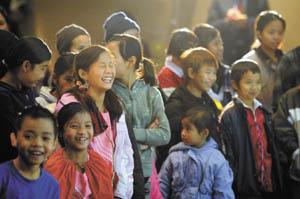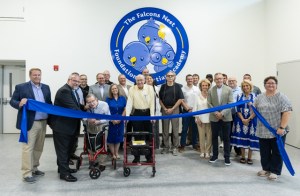Immigrants from Myanmar tell of struggles as refugees
Published 12:00 am Thursday, December 2, 2010

- Hunter Wilson/Daily NewsChildren gather to sing Wednesday at the start of “Forced from Our Villages: The Karenni Community Journey from Burma to Bowling Green” at Western Kentucky University’s Mass Media and Technology Hall.
Bowling Green’s Karenni community turned out Wednesday night to share their culture and stories as refugees from the Myanmar diaspora who have resettled here.
About 1,400 refugees from Myanmar, a Southeast Asian country bordering Thailand, have arrived in Bowling Green since 2000, according to James Robinson, director of Bowling Green’s International Center, a government-backed resettlement agency.
Trending
The event, “Forced from Our Villages: The Karenni Community Journey from Burma to Bowling Green,” drew many from the refugee community to the auditorium at Western Kentucky University’s Mass Media and Technology Hall.
Due to brutal persecution of ethnic minorities in Myanmar – or Burma, as the country is sometimes called – by the military-backed government, hundreds of thousands of people have been forced to flee the country since the late 1980s. Some of the refugees who have come to the United States are Kayan, an ethnic minority from the Karenni state in Myanmar.
“The needs of people in Burma are pretty basic,” said WKU political science professor Soleiman Kiasatpour. “They want to have autonomy and they want to have a voice in their government of their country, Burma. Unfortunately, this has been very difficult for them to achieve.”
One man, Bu Reh, told the audience how he had been forced to live for 12 years in a refugee camp in Thailand, where food was scarce. Reh and his brother had to leave the camp to hunt for food in the jungle, where his brother was killed by soldiers, he said through a translator.
A female refugee, Gee May, said she had been in the U.S. just nine months with her husband, who works nights at a chicken processing plant, and three small children. The children are attending school, and the family is grateful to be safe but has found learning the English language to be difficult, she said.
Often, media reports from Myanmar, such as the recent release of political activist Aung San Suu Kyi, tend to portray the situation for the average person there better than it actually is, Kiasatpour said.
Trending
“We need to pay closer attention to what is happening on the ground there,” he said. “If you search the news carefully you will see that the day after the Nov. 7, 2010, election there was another attack by a rebel group on a village near the Thailand border which resulted in another mass exodus of 15,000 more refugees into Thailand. We hear these stories like the release of Aung San Suu Kyi, but that does not necessarily mean things are getting any better for the average citizen in Burma.”
The event was sponsored by the WKU Office of International Programs, the WKU ALIVE Center for Community Partnerships, the Bowling Green International Center and DosVelas Pictures, a film company making a documentary about the refugees.







